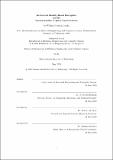| dc.contributor.advisor | R. David Edelman and Robert M. Denz. | en_US |
| dc.contributor.author | Loucks, William Harrison. | en_US |
| dc.contributor.other | Massachusetts Institute of Technology. Department of Electrical Engineering and Computer Science. | en_US |
| dc.date.accessioned | 2019-12-05T18:06:40Z | |
| dc.date.available | 2019-12-05T18:06:40Z | |
| dc.date.copyright | 2019 | en_US |
| dc.date.issued | 2019 | en_US |
| dc.identifier.uri | https://hdl.handle.net/1721.1/123159 | |
| dc.description | This electronic version was submitted by the student author. The certified thesis is available in the Institute Archives and Special Collections. | en_US |
| dc.description | Thesis: M. Eng., Massachusetts Institute of Technology, Department of Electrical Engineering and Computer Science, 2019 | en_US |
| dc.description | Cataloged from student-submitted PDF version of thesis. | en_US |
| dc.description | Includes bibliographical references (pages 128-137). | en_US |
| dc.description.abstract | This study presents a key management protocol for satellite communication which jointly considers features of the environment that may preclude existing asymmetric key exchanges and international legal instruments which may direct the most optimal form of cross-constellation third-party authentication within a global common. The approach, titled Kerberized Identity-Based Encryption (KIBE), utilizes aspects of Kerberos and identity-based encryption to establish a shared key, encrypt a message, and authenticate both of the aforementioned in a single transmission without the need for assets to share predistributed cryptographic material. KIBE is implemented using a network in which low-resource computers can simulate cross-constellation communication and mutual authentication using a trusted third-party. Lastly, this study illustrates how KIBE may be utilized to support an infrastructure of secure space-based communication systems as a result of cryptographic coordination with an internationally trusted entity to subsequently promote broader compliance with the international rule of law in outer space. | en_US |
| dc.description.statementofresponsibility | by William Harrison Loucks. | en_US |
| dc.format.extent | 137 pages | en_US |
| dc.language.iso | eng | en_US |
| dc.publisher | Massachusetts Institute of Technology | en_US |
| dc.rights | MIT theses are protected by copyright. They may be viewed, downloaded, or printed from this source but further reproduction or distribution in any format is prohibited without written permission. | en_US |
| dc.rights.uri | http://dspace.mit.edu/handle/1721.1/7582 | en_US |
| dc.subject | Electrical Engineering and Computer Science. | en_US |
| dc.title | Kerberized identity-based encryption and the interoperability of space-based systems | en_US |
| dc.type | Thesis | en_US |
| dc.description.degree | M. Eng. | en_US |
| dc.contributor.department | Massachusetts Institute of Technology. Department of Electrical Engineering and Computer Science | en_US |
| dc.identifier.oclc | 1129250381 | en_US |
| dc.description.collection | M.Eng. Massachusetts Institute of Technology, Department of Electrical Engineering and Computer Science | en_US |
| dspace.imported | 2019-12-05T18:06:39Z | en_US |
| mit.thesis.degree | Master | en_US |
| mit.thesis.department | EECS | en_US |
